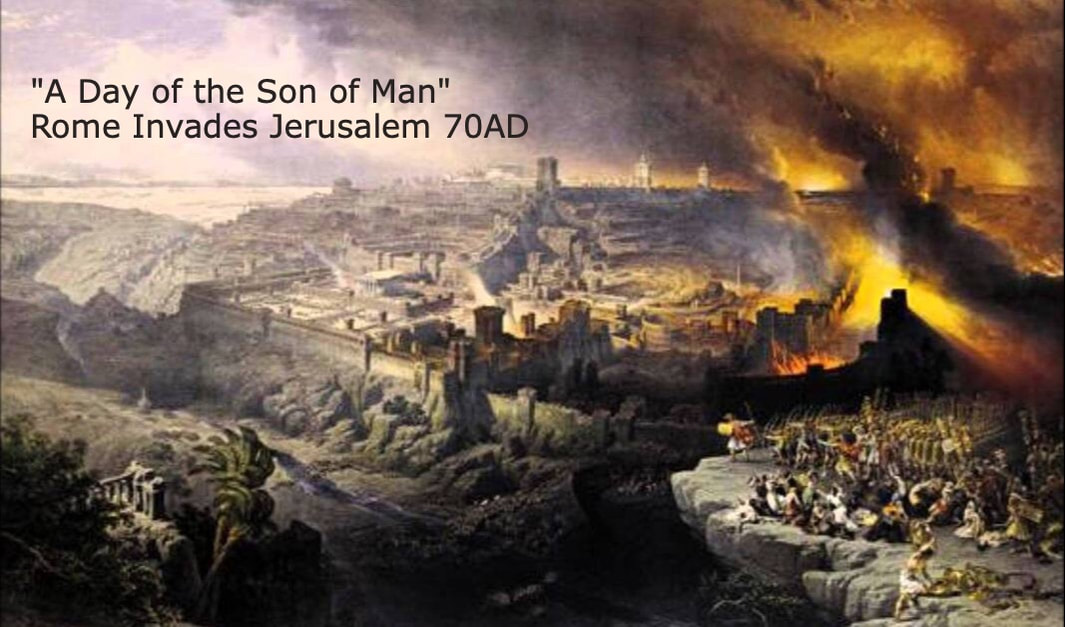
How could people so quickly adopt this new idea into their doctrinal statements? Because Jesus and Paul talk plainly about being “taken” during a future judgment. Jesus says in Luke 17:34-35, “I tell you, on that night there will be two in one bed; one will be taken and the other will be left. There will be two women grinding at the same place; one will be taken and the other will be left.” It certainly sounds like some people will be whisked away during whatever judgment Jesus is talking about in Luke 17:22-37. If you trust the Bible’s every word, how else could you read it?
Before we adopt this recent idea about the end times, we should investigate what being “taken” and “left” behind means when the Bible describes a coming judgment. The New Testament isn’t the first time these expressions were used. Mr. Darby might have misunderstood the meaning of “taken” and “left” behind by failing to read the language in the context of Old Testament prophecy.
To find the right OT context that informs Jesus’ language in Luke 17, we must first understand the larger message that Jesus was delivering. Jesus begins his warning in Luke 17:22 by saying to his disciples, “The days will come when you will long to see one of the days of the Son of Man.” Everything that follows is defined by his phrase “the days of the Son of Man.”
Jesus’ introductory expression alludes to decisive victories that military commanders won against their enemies. A “day of the commander” or “day of the lord” happens when a commander or lord deals a major blow to enemy forces. It means the good guys won against the bad guys.
This common phrase from the ancient Near East shows up all over the Old Testament. Time and again “the day of the Lord” describes one nation conquering another nation:
- Amos predicts Assyria’s conquest of the 10 northern tribes of Israel in Amos 5
- Zephaniah predicts Babylon’s defeat of the Philistines, Moab, Ammon, Ethiopia, and Assyria in “the day of the Lord’s anger” in Zephaniah 2
- Ezekiel predicts Babylon’s defeat of Egypt in Ezekiel 30
- Isaiah predicts Persia’s defeat of Babylon in Isaiah 13
In Luke 17:22-37, Jesus similarly uses the expression to refer to the coming destruction of a rebellious nation. Jesus compares the coming destruction to both the flood in Noah’s day (Luke 17:26-27) and Sodom and Gomorrah in Lot’s day (Luke 17:28-29). He says in Luke 17:30, “It will be just the same on the day that the Son of Man is revealed.” People didn’t expect the flood, but it happened suddenly. Sodom and Gomorrah thought everything was fine, but then they were caught off guard when disaster came. Jesus says the same thing is coming soon, at least after he suffers through many things and is rejected (Luke 17:25). During that imminent destruction that God is orchestrating, “One will be taken and the other will be left” (Luke 17:34).
So what exactly does Jesus mean for someone to be “taken” and someone else to be “left” behind during the coming judgment?
Our first clue to interpreting Jesus’ vague language is found in the flood story of Genesis. Genesis 7:23 summarizes the results of the flood this way, “God blotted out every living thing that was on the face of the ground, man and animals and creeping things and birds of the heavens. They were blotted out from the earth. Only Noah was left, and those who were with him in the ark.” Being “left” out of this judgment was a good thing. Noah was promised to be “left” after the judgment. It meant he would escape death. Everyone else got killed.
The same positive meaning for being “left” after God’s judgment continues through the Old Testament prophets’ predictions of judgment. When Isaiah predicts the coming destruction of Israel, he gives reason to hope by noting that some people will remain.
In that day the branch of the LORD shall be beautiful and glorious, and the fruit of the land shall be the pride and honor of the survivors of Israel. And he who is left in Zion and remains in Jerusalem will be called holy, everyone who has been recorded for life in Jerusalem. – Isaiah 4:2-3
Jeremiah uses the same language to describe Jerusalem’s coming destruction: “Therefore I am full of the wrath of the LORD; I am weary of holding it in. ‘Pour it out upon the children in the street, and upon the gatherings of young men, also; both husband and wife shall be taken, the elderly and the very aged” (Jeremiah 6:11). Everyone who is “taken” in this prophecy is experiencing God’s judgment. In history, this judgment refers to the Babylonian invasion where Jerusalem was sacked, many were killed, and the rest were taken into exile in Babylon. You definitely wanted to be left out of that judgment!
In the Minor Prophets, we find two more examples of this language. Zephaniah describes how God will remove the wicked and leave a remnant of righteous people in Jerusalem after its judgment.
“In that day you will feel no shame because of all your deeds by which you have rebelled against Me; For then I will remove from your midst your proud, exulting ones, and you will never again be haughty on My holy mountain. But I will leave among you a humble and lowly people, and they will take refuge in the name of the Lord. Those who are left in Israel…” – Zephaniah 3:11-13a

The resounding message of OT prophets predicting judgment is: God is punishing those who are “taken” and rescuing the people “left” behind. That paradigm should be the backdrop against which we interpret Jesus’ words in Luke 17.
Which Judgment Was Jesus Predicting?
If Jesus is using the same language as OT prophets who predicted judgment, then what judgment was he talking about? The clearest clues come from Matthew 24 where the language about being “taken” or “left” behind from Luke 17 is also found in Jesus’ prediction of Jerusalem’s destruction.
How similar are Luke 17 and Matthew 24? Both passages have the same surrounding analogies and promise of coming doom.
- Jesus uses the same Old Testament analogy in Matthew 24:37-39 that is recorded in Luke 17:34-35. The events will be like Noah’s flood.
- Both passages say the amount of death it causes will attract vultures to the center of the conflict (Luke 17:37; Matthew 24:28).
- Both passages say the coming of the son will be impossible to locate precisely. They describe the coming of the son like lightning flashing across the sky (Luke 17:24; Matthew 24:27) — which means nobody can figure out exactly where it originated or where it went.
- Both passages begin by warning the disciples to avoid people who claim to know where the Messiah is (Luke 17:22-23; Matthew 24:23-26).
Jesus is predicting another judgment coming upon unfaithful Israelites who rejected him, just like Isaiah and Jeremiah and many other OT prophets did before him. He is not talking about his return to snatch people off of earth. The plain way to interpret his words in line with the story of Scripture is another “coming” of the Lord to judge. That is how we should read the language of being “left” while another is “taken” in Matthew 24:40-41. If people don’t want to be “taken,” or killed, during that deadly event, they should get out of Judea immediately when the slaughter begins.
When did Jesus say this coming judgment would happen in Judea? He does provide a general timeframe with two bookends. He says it will take place after he suffers and is rejected by his generation (Luke 17:25). He also says in Matthew 24:34 that “this generation will certainly not pass away until all these things have happened.” So the judgment is situated during the generation of Jesus’ disciples after Jesus was gone but before all of them pass away.
With all those parameters, we can discern that the judgment Jesus predicted was carried out by Roman armies who invaded Israel and sacked Jerusalem in 70AD. Just like God used Babylon to punish his unfaithful people in Jeremiah’s day, he used Rome during the generation of Jesus’ disciples. Jesus did not physically appear during the Roman invasion just like God did not physically appear during the “day of the Lord” that Jeremiah predicted over 600 years earlier. The language of his “coming” was simply Ancient Near Eastern shorthand for a decisive victory over his enemies (see Isaiah 19 for the Lord’s “coming” against Egypt in judgment). All the people who rejected their Messiah around Jerusalem faced serious consequences for that decision.
For those of you who were not aware of the Old Testament prophetic language that Jesus used in Luke 17 and Matthew 24, you can now see that the judgment Jesus predicted isn’t what you first think. Jesus' original Jewish audience would have recognized the prophetic language. They would have wanted to be “left” behind after God’s judgment rather than “taken” during it.
This scenario fits perfectly with Jesus’ parables of coming judgment with the arrival of God’s kingdom. In Matthew 13:41-42, Jesus promised that the Son of Man would remove disobedient people from his kingdom. He explicitly describes the spiritual significance of removing the unrighteous and leaving behind the righteous. “Then the righteous will shine like the sun in the kingdom of the Father” (Matthew 13:43). The good guys would be left behind as the citizens of a new kingdom that all submitted to a new king Jesus, enthroned in heaven. Just as Jesus spoke of the kingdom coming in Luke 17:20-21 before his prophecy of judgment, “The coming of the kingdom of God is not something that can be observed, nor will people say, ‘Here it is,’ or ‘There it is,’ because the kingdom of God is in you.” It is among God’s faithful people who remain.
It’s time to correct the mistaken notion of a global rapture of all God’s people in some futuristic doomsday scenario. No one is getting snatched off the earth in some surprising end-of-the-world scenario. Jesus’ prediction of a historical judgment of his unfaithful people in the first century AD is the same kind of judgment that OT prophets predicted before him. And it had the same purpose. Eliminate the unfaithful so that those who remain could become the kind of people God wanted everywhere in the world. His plan was to leave behind a faithful remnant that would represent his values in a loving community for all the world to see.
I hope we are embodying that kind of kingdom today that our king gave his life to create on earth.








 RSS Feed
RSS Feed
